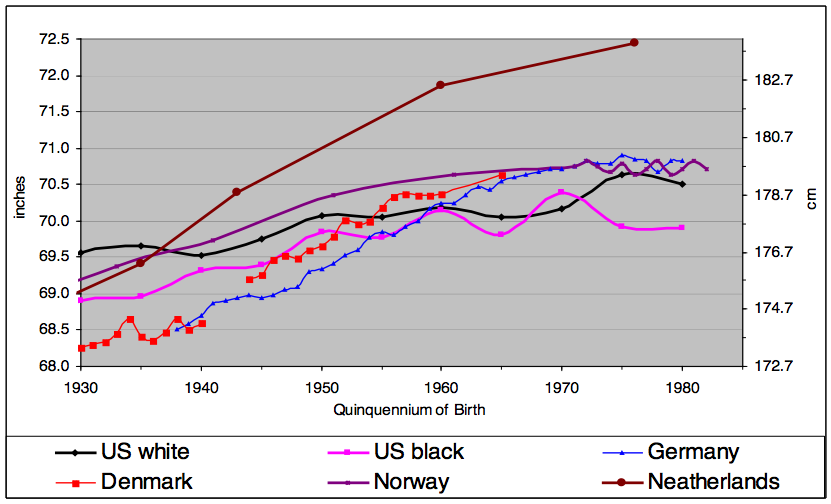NPR had a fascinating story this morning on how height equals health. Northern Europeans are now the world’s tallest people, led by the Dutch. The average Dutch man is 6 feet tall, while the average American man maxes out at 5-foot-9. What’s going on, and why does height matter?

John Komlos, economist at the University of Munich, in his study Underperformance in affluence: the remarkable relative decline in American heights in the second half of the 20th-century says. “Height is like holding a mirror to society’s well-being.”
Health insurance is an important factor:
Good health care and good nutrition during pregnancy and early childhood are two reasons why the Dutch have grown so tall, Komlos says. In addition, the Dutch guarantee equal access to critical resources like prenatal care. That’s not the case in the United States, where 17 percent of the population has no health insurance.
Highlights from NPR’s report Measuring A Country’s Health By Its Height
Through most of American history, we’ve been the tallest population on the planet. Americans were two inches taller than the Englishmen they fought in the Revolutionary War, thanks to abundant food and a healthy rural life, far from the disease-ridden cities of Europe.
But we’re no longer at the top. Northern Europeans are now the world’s tallest people, led by the Dutch. The average Dutch man is 6 feet tall, while the average American man maxes out at 5-foot-9.
The height of Americans reached a plateau in the 1960s. As a nation, we have not grown taller but we also have not lost stature. Komlos says groups of people usually don’t lose height unless they’re in the midst of a famine or a war. “It has practically never occurred in peacetime,” he says.
Economists are interested in these biological questions about nations because while height is a reflection of health and nutrition, those factors usually result from economic well-being.
Economic success and height even correlate to some degree on an individual level. Taller people tend to be smarter, and to earn more.
Andreas Schick, a graduate student at Ohio State University in Columbus, is trying to figure out why. He thinks it gets down to the fact that someone who is healthy and well-fed enough to grow tall — or to the individual’s maximum potential genetic height — is also someone who is able to grow a strong, capable brain.
“If you’ve reached your maximum height, that probably means you’ve reached your physical and mental development,” Schick says. “That helps you reach your maximum potential, be that intellectually or socially.”
But the fact that Americans aren’t getting taller means more and more children won’t have the chance to reach their maximum potential, Komlos says.
And that has ramifications for the future. “A population that is not taking care of their children and youth is going to be in difficulties in a generation or two,” he says.
At Howard University Hospital in Washington, D.C., two miles northwest of the White House, Rana says he sees children in difficulty every day. Many of his young patients suffer health problems from obesity — too many empty calories and fat. Others are not getting enough to eat.
“You would be shocked by how many kids go without food in this town,” he says. “What you have to do is go to clinics like ours and ask people: Did you have a meal today?”
For more on healthcare, see: